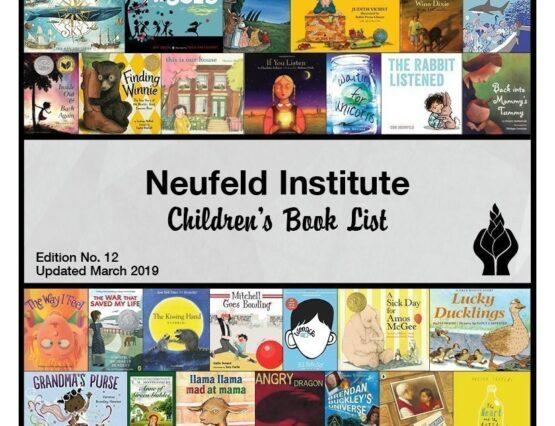
Each year around this time, I get the great honour of helping curate the list of books for the Neufeld Institute’s list of children’s literature recommendations, match-making parents and professionals with outstanding kids’ books.
Our list includes more than 200 titles — a mix of picture books, books for the very young, early readers and chapter books, middle-grade books, young-adult books, and books to enjoy as a family — sorted by categories such as connections to parents; books about grandparents, extended family, villages of attachment; books that help with the language of feelings; books that inspire or portray play; books about relationships to special teachers; books about or for transplanted children; along with books for special challenges such as death, divorce, allergies, cancer, learning disabilities, moving, and sensitivity/giftedness.
Let me just say how much I love this list, each and every one of the books we recommend, and the process that goes into pulling the list together. With three or four of my savvy and soft-hearted colleagues, we spend the day at Vancouver’s Kidsbooks poring over hundreds of books — books we’ve been keeping on our radars for the last year, books the Kidsbooks staff recommends, as well as the gems we discover in the store. We laugh. We cry. Sometimes we rant or pout. We discuss our attachment-based developmental theory as it’s showing up (or not) in themes, dialogue, illustrations, plot, and emotions. And we do it all in the memory of Gail Carney, our mentor, artist, and friend who left this special legacy for the Neufeld Institute.
Each spring, the list — which has grown to become a booklet — is updated and published in time for the Annual Vancouver Neufeld Conference. We have this year’s booklet locked in, ready for its debut at the upcoming conference taking place March 1st and 2nd, and I am eager to share it with the world! Hopefully, without stealing any thunder from the full list, over the next few weeks I’ll be sharing my personal reviews of some of the books that we’ve added to this year’s list that I’m especially excited about.
The first picture book is Captain Starfish, written by Davina Bell and illustrated by Allison Colpoys (Abrams Books for Young Readers, 2015). I adore this book so much, and the story of Alfie, who wakes feeling worried about the Underwater Dress-Up Parade he is supposed to lead the next day dressed up in his starfish costume.
In spite of positive self-talk about his bravery and his very supportive parents, Alfie is still plagued with heavily weighted nightmares. “He dreamed that he was carrying the ocean, all on his own.”
He wakes up and shares with his mom that he’s not ready, fearing she will be angry. She’s not, she reassures him. Then she takes him somewhere special — the aquarium, where Alfie quietly works through his emotions.
On the way home, Alfie delightedly recounts his experience with a clown fish that seemed to connect with him. “‘He came out, but only for the tiniest second!’ said Alfie. ‘I think he smiled at me.’”
Mom’s soft response gently showers her son with both insight and acceptance:
“‘Sometimes clown fish need to hide away,’ said Mom. ‘It’s just what they do.’
‘People too,’ said Alfie, thinking of the dress-up parade, which didn’t seem quite so scary now.’”
What I most cherish about this book is its unexpected ending. Where I thought we were going all along was: Thanks to the fish encounter, Alfie would now have the courage to rush over to the Underwater Dress-Up Parade and do his part, after all. I would have been okay with an ending like this. So many books convey the mixed feelings that Dr. Gordon Neufeld calls “dragon and the treasure,” and usually end up conquering the fear to get to the treasure in a very satisfying way, after all.
But Captain Starfish rises even further above because it takes a different approach. Conquering our fears doesn’t always happen so quickly. Sometimes the process takes more time, especially for our really sensitive kids.
Contrary to my expectation, Alfie missed the parade this year. In fact, when Alfie and Mom return home, “It was so late that … Dad had already run the bath.” It’s then that we realize how Mom had protected Alfie from shame and overwhelm by taking him to the aquarium, and how she accepted him exactly where he was without pushing him to meet society’s expectations.
Alfie is at peace with his decision not to be Captain Starfish that day. Underwater Dress-Up Parade or not, Alfie has grown. He knows he’ll have the confidence to participate next year.
And he does … as a clown fish.
Editor's note: You can purchase the Neufeld Institute Children’s Book List here
For more book reviews by Sara Easterly, visit Book Bonding.
